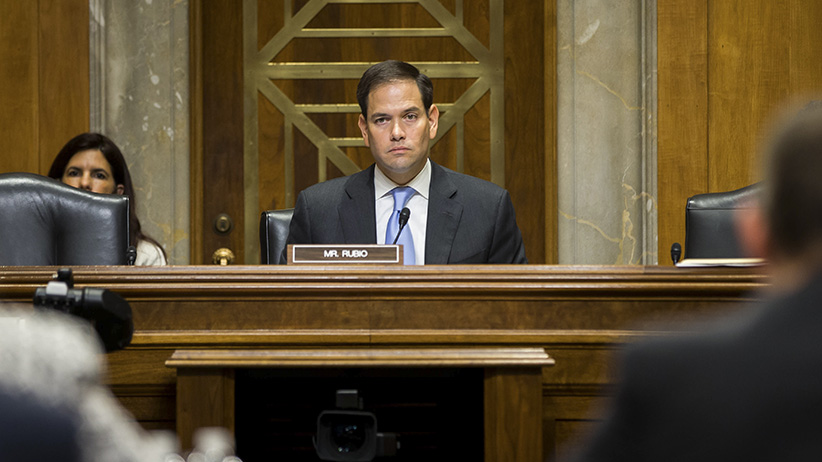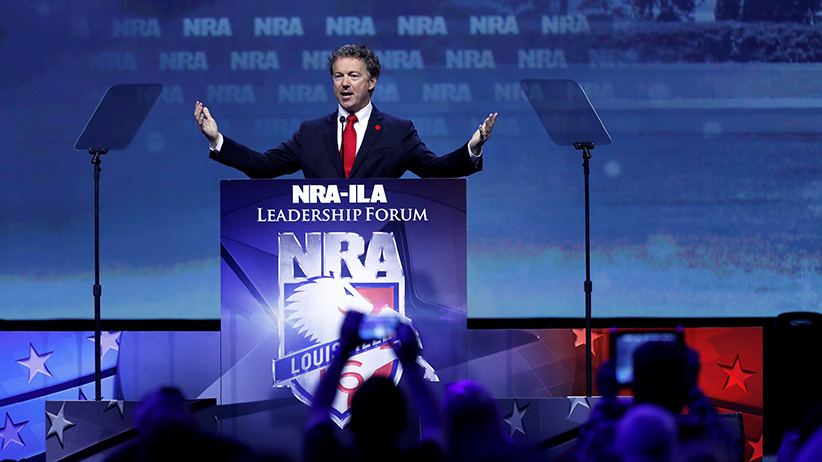Life after Trump: Failed Republican candidates return to Washington
Swept away by Trump, Republican candidates return to the painfully unglamourous reality of Washington
Sen. Marco Rubio (R-Fla.) during a Senate Foreign Relations Subcommittee on Western Hemisphere, Transnational Crime, Civilian Security, Democracy, Human Rights and Global Women’s Issues hearing on drug cartels and the opioid epidemic, in Washington, May 26, 2016. (Zach Gibson/New York Times/Redux)
Share

Becalmed in the eye of the tempest, “Little” Marco Rubio sits at a table set for 21, next to 20 empty chairs. We are waiting for the start of a United States Senate hearing on hurricane preparedness, and Rubio, the former golden-boy presidential candidate who was verbally shrunk and electorally sunk by Donald Trump, is the convener.
There is one reporter at the press table. A smattering of interns and senior-tripping high school students comprise the audience. Congressional hirelings robotically scroll their feeds. It is very hot outside.
A couple of other members of the self-described “world’s most exclusive club” filter in: Cory Booker of New Jersey, who may or may not be Hillary Clinton’s vice-presidential running mate this year, or presidential lumber himself by 2024 or ’28; Democrat Bill Nelson, former space shuttle astronaut and now Florida’s senior senator, with Rubio his nominal junior; Republican Kelly Ayotte of New Hampshire.
Then Ayotte’s cellphone rings and she leaves the chamber, never to return—an apt metaphor for the doom that she, and many other Republicans from the U.S. Capitol to Cornstalk County dogcatcher, may face in their re-election bids this autumn with the Donald at the top of the ticket. Most of the other committee members, including “Lyin’ ” Ted Cruz of Texas, as Trump succinctly damned him, don’t bother to show up at all. After all, how many hurricanes ever hit Texas? (Only about one a year.)
Well-briefed and smiling—and with no further need to ridicule the Canadian Cruz for not speaking Spanish, or to try to emasculate Trump as “a con artist” with suspiciously small hands, or to remind everybody on the planet yet again that his own father was a bartender and his mother was a hotel maid —Rubio leads the director of the National Hurricane Center through his testimony. They speak of coastal flooding, five-day forecasting and sturdy new drones that can fly right into a category-five storm and emerge alive. “We must never sit idle and succumb to hurricane amnesia,” Rubio chides.
While this is happening within the august Senate, the maelstrom roars deafeningly without. Less than one year ago, there were 22 announced and viable candidates for the presidential nominations of the two major national parties—governors, senators, solons, women, immigrants’ children, multi-ethnics, and a solitary Trump. Now there are only three—combined age, more than 210—each one burning through his or her personal charcoal of resentments, promises, posturing, libels and lies, day after day after day.
On this day, Trump, the New York billionaire, is in North Dakota, vowing to resurrect the Keystone pipeline, as long as the United States receives a “significant piece of the profits,” and snake-oiling a roaring crowd of wildcatters with the bromide that “you have to be wealthy in order to be great.”

(Within seconds, Hillary’s campaign shoots out an email to remind the nation what Trump said on a similar theme, back in 1999: “My entire life, I’ve watched politicians bragging about how poor they are, how they came from nothing, how poor their parents and grandparents were. And I said to myself, if they can stay so poor for so many generations, maybe this isn’t the kind of person we want to be electing to higher office. How smart can they be? They’re morons.”)
Clinton herself is in California, where she declares that “I will be the nominee” regardless of what happens in the Golden State’s primary next Tuesday, and powerless to influence what the Federal Bureau of Investigation will decide to do (or not do) about her barely legal (or barely illegal) private email server. Back in Washington, the FBI is mulling the claim of a former Romanian taxi driver, web-name Guccifer, that “it was easy” for him to hack into Hillary’s inbox.
And Bernard Sanders, for decades an obscure and obstinately independent small-city mayor and Congressman from an insignificant state, is feinting with Trump about staging a slapstick, pay-per-view debate for charity—a Thrilla in Coachella to benefit the Clinton Global Initiative, perhaps?—while Clinton glowers outside the ropes. This occupies the news cycle for a night and a day before vanishing like a Toronto capybara.
“There’s a lot of negativity going on in politics,” Rubio says in the Senate hearing room, in the understatement of the day.
When the hearing concludes, Rubio walks, unencumbered by an entourage, alone with a Maclean’s reporter down the marble halls. “It was a political campaign; I didn’t go to war,” the Floridian says. “It was an honour to be able to do it, to run a credible campaign, but ultimately, Donald won the election, he’s our nominee. It was enriching and rewarding. We didn’t get the result we wanted but I feel very good about it.”
Related: Cleveland prepares for trouble at the Republican convention
It has been Rubio’s position since he declared for the White House that he would not be returning to the Senate in 2016. This edifice is cracking. Now Little Marco is wavering on his withdrawal, and Trump, always the sportsman, is tweeting, “Important to keep the MAJORITY. Run Marco!”
Down the corridor, another Senate panel is convening; it’s the Homeland Security and governmental affairs committee. Seated around a large table spread with blue baize are, among others, the aforementioned Ayotte and Booker, and another loser from the campaign trail, Rand Paul, the Republican ophthalmologist from Kentucky.
Paul, who was a rare figure of decorum during the televised debates, dropped out of the race in February. Today, he is pushing a bill that would reward federal employees who detect wasteful spending with a cut of the proceeds. “With a $3.8-trillion budget, my guess is we occasionally over-appropriate,” Paul wryly declaims.
“I applaud Sen. Paul,” Booker responds. “When I was mayor of Newark, we had workers who would see stupid stuff going on and feel powerless to do anything about it.” Then they call the roll on Rand Paul’s initiative and Booker, a Democrat, votes No. Of course.
When the hearing concludes, Paul walks, unencumbered by an entourage, alone with a Maclean’s reporter down the marble halls. He is wearing white bucks and a summer suit, making him the last man in America still trying to look like Pat Boone. “I’m glad I went through it,” he says of the campaign. “I don’t have any regrets.”
Rand Paul is running for re-election to the Senate. An hour later, his campaign sends a message that says, “Patriot, I know I’ve counted on you before, but Patriot, I wouldn’t be emailing you today unless it was urgent, and it is. Patriot, with liberal forces gunning for me, I must ask for your generosity once again.”
Where are the rest of the 22—all of the people with nothing to do and nothing to lose? A few weeks ago, they were the world’s cynosure. Now, most of them have vanished. Chris Christie and Ben Carson campaign with varying degrees of enthusiasm for Trump. Jeb Bush has emerged only to say that he will not attend the Donald’s coronation in Cleveland. Cruz has filed for re-election to the Senate in 2018. Democrat Martin O’Malley moans to a Baltimore television interviewer that he only received 22 per cent of the questions during his debates with Bernie and Hillary. “The rules are never designed in a way to help the challenger,” O’Malley complains, as if Sanders and Trump were favourites going in.
And at a Trump speaking engagement in Washington, a reporter bumps into Jim Gilmore, the former governor of Virginia and one of the original 17 Republicans in the contest. You needed the Hubble Space Telescope to see Gilmore’s vote total in Iowa (12) and New Hampshire (133). The Donald never even blessed him with a vile nickname. He was home and cooled out by Purim.
But Gilmore, like Little Marco and Lyin’ Ted and Low-Energy Jeb, was one of the horses in the most extraordinary derby in electoral history, and this is a boast that never can be taken away.
“We need to hear what our candidate’s views are,” he is saying, in the eclipse of the nominee. “Did anyone think that, of the 17, it would be Trump who was giving this speech?
“I wish it had been me.”